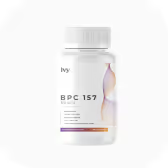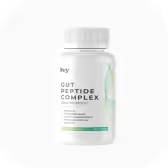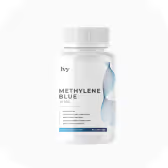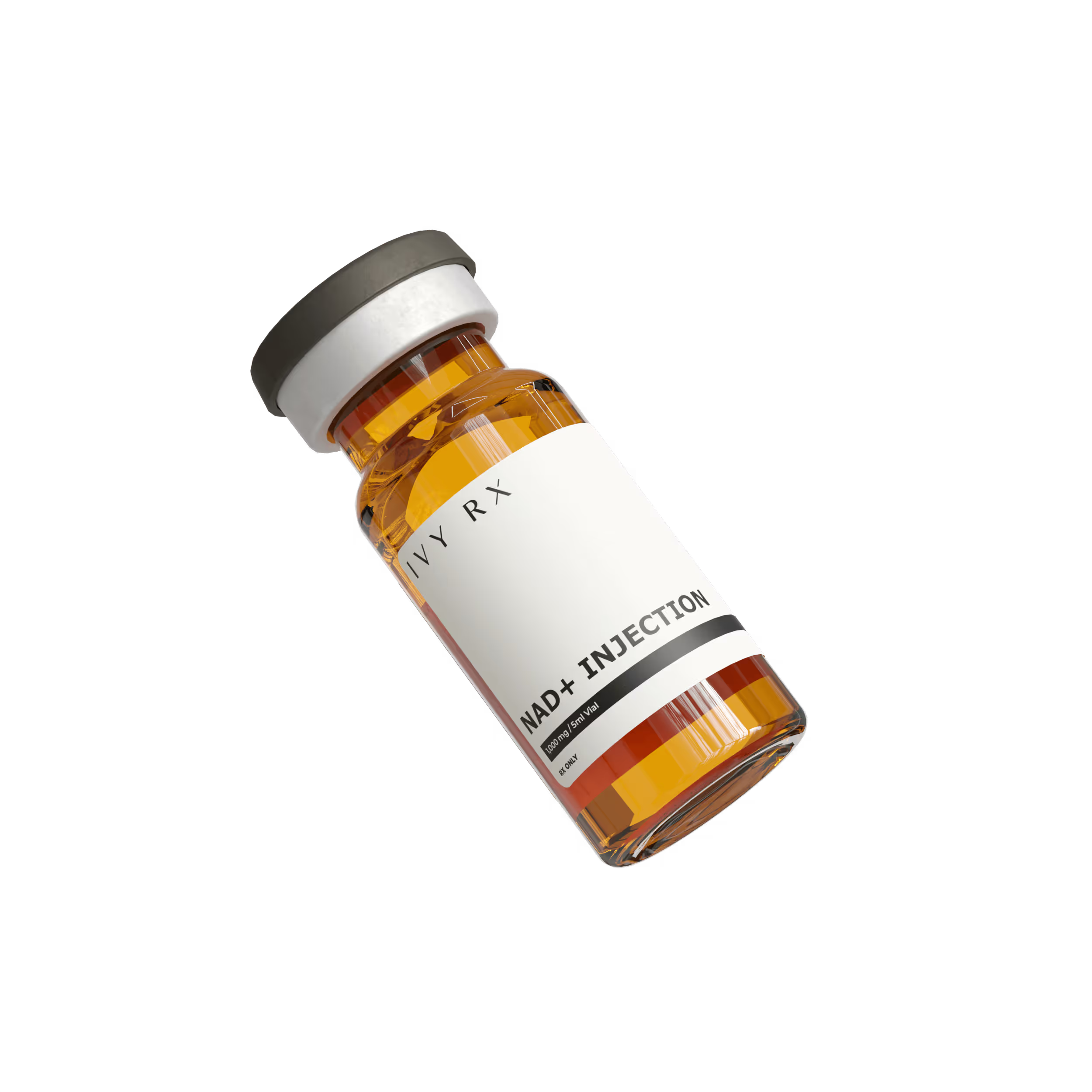Article Outline
Explore Anti-Aging Treatments


NAD+ Nasal Spray vs Injection: Which One is Right For You?
Looking for an anti-aging treatment to feel revitalized and energized?
Over the past few years, NAD+ therapy has become a popular tool for delaying signs of aging, boosting vitality, and supporting mental clarity.
And the best part? NAD+ supplements are easy to access and simple to use, with two convenient options—NAD+ nasal spray and NAD+ injection. This way, you can choose the method that best fits your lifestyle.
Both types of supplements can be effective. However, there are key differences to consider when choosing between them.
In this article, we’ll break down everything you need to know to help you make the right choice. We’ll cover effectiveness, benefits, main differences, potential side effects, and more to help you find the best solution.
What is NAD+ Therapy?
Often referred to as the molecule of life, NAD+ (nicotinamide adenine dinucleotide) is a vital coenzyme. It fuels cellular energy, supports DNA repair, and plays a crucial role in metabolic health.
NAD+ levels naturally decline with age, so NAD+ therapy aims to restore these levels, playing a crucial role in anti-aging.
It does so through various delivery methods, such as injections, nasal sprays, and oral supplements. Its main benefit is cellular repair, which has multiple outcomes:
- Powers mental clarity
- Enhances energy levels
- Aids muscle recovery and healing
- Improves metabolic function
- Supports your immune system
In short, NAD+ supplements help your body feel youthful, strong, and healthy.
If you’re considering starting this treatment, choosing the right NAD+ delivery method is key to its effectiveness.
It influences bioavailability, absorption, and dosage control, impacting your lifestyle and overall outcomes.
How Does NAD+ Nasal Spray Work?
Nasal sprays are one of the most popular and convenient methods of administering NAD+ therapy. They are absorbed through the nasal mucosa, allowing efficient uptake into the bloodstream.
NAD+ nasal spray delivers a low concentration of NAD+ (between 50 mg to 200 mg) into the body, sustaining its effects for up to 12 hours (peak levels occur at around 4 to 6 hours).
All things considered, it offers a convenient, non-invasive way to take NAD+ while supporting energy production, cognitive function, and cellular repair.
How Do NAD+ Injections Work?
NAD+ injections deliver the coenzyme directly into the bloodstream. As the name suggests, they require a needle and a syringe.
Healthcare providers typically administer NAD+ injections in high amounts, as the dosage can range from 100 mg to 1 gram. Usually, it takes between 30 minutes and two hours for the absorption to begin.
This means that it allows for a higher concentration of NAD+ to be delivered to the body in a shorter amount of time than a nasal spray.
All in all, this method allows for rapid absorption, making it ideal for those seeking an immediate energy boost or cognitive enhancement.
NAD+ Nasal Spray vs Injection: A Head-to-Head Comparison
Looking for the right method for you? Consider key factors like convenience, cost, and comfort. This will help determine whether NAD+ nasal sprays or injections are the best fit for you.
Next, we’ll explore the key aspects to consider when exploring your options.
Effectiveness of NAD+ Nasal Spray
NAD+ nasal spray provides an easy anti-aging treatment. Its key feature is that it delivers a lower concentration of NAD+ over an extended period for gradual absorption.
Here's a breakdown of its effectiveness, absorption, and convenience:
- Dosage: It is typically administered in small doses, ranging from 50 mg to 200 mg per spray (dose).
- Frequency: Generally used daily for consistent NAD+ replenishment.
- Delivery speed: NAD+ nasal spray maintains steady levels over 4 to 6 hours. The effects can last up to 12 hours, depending on dosage and individual metabolism.
- Absorption: Lower absorption rate (estimated 20 to 40%). This may help maintain steady NAD+ levels in the body over time.
- Cost: It is more affordable. The price per bottle ranges between $50 and $150. Each bottle has around 30 to 60 doses, so the equivalent per dose is around $2 to $7.
Effectiveness of NAD+ Injections
NAD+ injections provide a more potent and immediate effect. This is because it delivers high concentrations of NAD+ directly into the bloodstream.
Let’s go over the key considerations to evaluate their effectiveness:
- Dosage: NAD+ injections are administered in larger doses, ranging from 100 mg to 1,000 mg (1 gram) per injection.
- Frequency: Can be used daily, weekly, or as needed, depending on treatment goals.
- Delivery speed: Absorption begins almost immediately after injection. Peak NAD+ levels occur within 30 minutes to 2 hours.
- Absorption: It features a higher absorption rate (near 100%), ensuring rapid NAD+ replenishment—a key benefit for energy boosts and cognitive enhancement.
- Cost: Generally more expensive than nasal sprays due to the cost of needles, syringes, and administration. The price per injection ranges between $200 and $1,000, depending on dosage, provider, and location.
Benefits of NAD+ Nasal Spray and Injections
Both NAD+ nasal spray and injections provide unique advantages and anti-aging benefits. However, while both methods support NAD+ replenishment and energy boost, their benefits vary.
Below, we break down the key benefits of each method to help you understand which one better fits your needs.
NAD+ Nasal Spray
NAD+ nasal spray is an accessible option for those looking for an easy and consistent way to boost NAD+ levels. Its main benefits are:
- Non-invasive and easy to use: It doesn't require needles or medical supervision. This makes it a convenient option for daily use.
- Gradual and sustained release: Nasal spray maintains steady NAD+ levels for up to 12 hours.
- Portable and discreet: Ideal for on-the-go supplementation without the hassle of injections.
- More affordable: Generally less expensive than injections, making it a cost-effective choice.
- It may reduce your risk for chronic age-related disease.
NAD+ Injections
NAD+ injections are less convenient in daily life than nasal sprays. However, they provide a rapid boost in energy, cognitive function, and cellular repair.
- Before and after NAD+ injections: Many users report a significant increase in energy and mental clarity. The effects are noticeable, especially for those seeking fast results.
- Higher absorption: Injections enter the bloodstream, allowing for faster and more potent effects.
- Immediate energy and cognitive boost: Ideal for those seeking rapid effects, with peak benefits—such as enhanced mental clarity and physical endurance—occurring within 30 minutes to 2 hours.
- Higher NAD+ concentration: It delivers larger doses (100 mg to 1,000 mg) with a 100% absorption rate in short periods. This maximizes effectiveness and delivers rapid results.
- More controlled dosing: Ensures the amounts of NAD+ are precise for optimal results.
Potential Side Effects of NAD+ Nasal Spray and Injections
NAD+ therapy is generally safe. Yet, it’s important to be aware of potential side effects. While these are totally normal, the risk and intensity of these symptoms depend on your sensitivity, dosage, and overall health.
Below, we outline the common side effects of each method.
NAD+ Nasal Spray
NAD+ nasal spray is considered a well-tolerated treatment. Still, it may cause mild side effects. This is especially true for individuals with nasal sensitivities or allergies.
- Nasal irritation: Some users may experience mild discomfort, dryness, or congestion in nasal passages
- Headaches: A temporary headache may occur as the body adjusts to increased NAD+ levels
- Runny nose or sneezing: The spray can trigger this. It is more common for those vulnerable to nasal sensitivities
- Mild dizziness: Some individuals report lightheadedness shortly after use
NAD+ Injections
NAD+ injections deliver a concentrated NAD dose directly into the bloodstream. This may cause stronger or more immediate side effects, especially with higher doses.
- Injection site reactions: Redness, swelling, or pain at the injection site can occur.
- Flushing or warmth: A temporary warming sensation or skin flushing is common.
- Nausea: Some individuals may feel nauseous, especially with high doses.
- Fatigue or dizziness: A drop in blood pressure or a sudden change in energy levels can lead to temporary dizziness or fatigue.
- Muscle discomfort: Some users report muscle cramps or soreness after an injection.
Which Option Is Best for You?
Both NAD+ nasal sprays and injections are effective, but key differences may influence your choice.
Each method has its own advantages. Your choice will depend on your needs, lifestyle, and health goals.
To summarize:
- Choose NAD+ nasal spray if you prefer a non-invasive, convenient option with gradual absorption that fits easily into your daily routine. It’s ideal for those looking for steady NAD+ support without the need for needles.
- Choose NAD+ injections if you want a faster, more potent effect with higher efficiency. This method is better for those seeking rapid energy boosts, mental clarity, or intensive cellular repair.
Also, consider combining both methods. You can implement a nasal spray for daily maintenance and injections for more intensive therapy.
Remember that consulting a medical professional is crucial. They will help you assess which method better fits your needs and ensure the most effective NAD+ supplementation.
Get Effective NAD+ Treatment at Ivy Rx!
Whether you choose NAD+ nasal spray for convenience or NAD+ injections for quick effectiveness, selecting the right method is key to maximizing results.
At Ivy Rx, we deliver high-quality NAD+ treatments for healthy aging. We tailor our programs to your needs, ensuring optimal absorption and effectiveness.
We also offer other anti-aging and well-being treatments, such as Glutathione Nasal Spray.
Our healthcare professionals can guide you in choosing the best option based on your health goals and lifestyle.
Experience the benefits of NAD+ therapy with Ivy Rx—start your journey to better health today!

Ivy RX patients
Members of Ivy RX branded medications were paid for their testimonials.
Related
Resources

5 Best Peptides for Energy & Fatigue Relief in 2026
We explain the top peptides for energy and easing fatigue, plus tips on choosing the right protocol and what to know before...

Does Microdosing GLP-1 Work? What the Evidence Shows (2026)
Does microdosing GLP-1 actually work for weight loss or appetite control? Learn what patients experience, what evidence exists, and key limitations.

Is it Safe to Take Metformin & Ozempic Together? [2026 Guide]
Wondering if you can take metformin and Ozempic together? Learn how they work, benefits, side effects, and who this combo is right for in this 2026 guide.

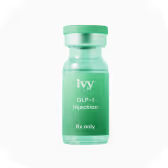

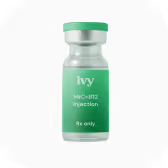


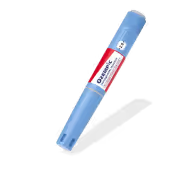

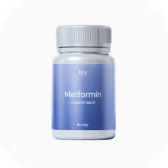

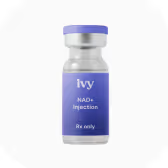
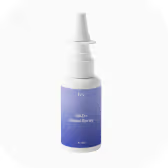

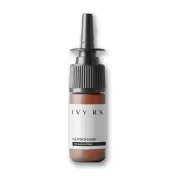
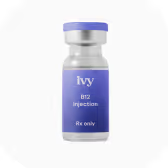
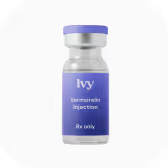
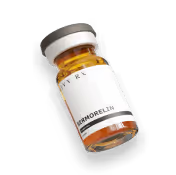
.avif)

